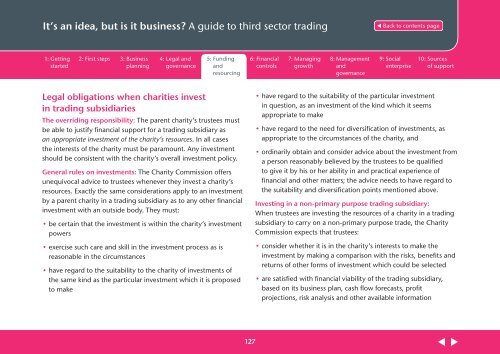A guide to third sector trading - WCVA
A guide to third sector trading - WCVA
A guide to third sector trading - WCVA
Create successful ePaper yourself
Turn your PDF publications into a flip-book with our unique Google optimized e-Paper software.
It’s an idea, but is it business? A <strong>guide</strong> <strong>to</strong> <strong>third</strong> sec<strong>to</strong>r <strong>trading</strong><br />
1: Getting<br />
started<br />
2: First steps 3: Business<br />
planning<br />
4: Legal and<br />
governance<br />
5: Funding<br />
and<br />
resourcing<br />
6: Financial<br />
controls<br />
7: Managing<br />
growth<br />
8: Management<br />
and<br />
governance<br />
9: Social<br />
enterprise<br />
10: Sources<br />
of support<br />
Legal obligations when charities invest<br />
in <strong>trading</strong> subsidiaries<br />
The overriding responsibility: The parent charity’s trustees must<br />
be able <strong>to</strong> justify financial support for a <strong>trading</strong> subsidiary as<br />
an appropriate investment of the charity’s resources. In all cases<br />
the interests of the charity must be paramount. Any investment<br />
should be consistent with the charity’s overall investment policy.<br />
General rules on investments: The Charity Commission offers<br />
unequivocal advice <strong>to</strong> trustees whenever they invest a charity’s<br />
resources. Exactly the same considerations apply <strong>to</strong> an investment<br />
by a parent charity in a <strong>trading</strong> subsidiary as <strong>to</strong> any other financial<br />
investment with an outside body. They must:<br />
• be certain that the investment is within the charity’s investment<br />
powers<br />
• exercise such care and skill in the investment process as is<br />
reasonable in the circumstances<br />
• have regard <strong>to</strong> the suitability <strong>to</strong> the charity of investments of<br />
the same kind as the particular investment which it is proposed<br />
<strong>to</strong> make<br />
• have regard <strong>to</strong> the suitability of the particular investment<br />
in question, as an investment of the kind which it seems<br />
appropriate <strong>to</strong> make<br />
• have regard <strong>to</strong> the need for diversification of investments, as<br />
appropriate <strong>to</strong> the circumstances of the charity, and<br />
• ordinarily obtain and consider advice about the investment from<br />
a person reasonably believed by the trustees <strong>to</strong> be qualified<br />
<strong>to</strong> give it by his or her ability in and practical experience of<br />
financial and other matters; the advice needs <strong>to</strong> have regard <strong>to</strong><br />
the suitability and diversification points mentioned above.<br />
Investing in a non-primary purpose <strong>trading</strong> subsidiary:<br />
When trustees are investing the resources of a charity in a <strong>trading</strong><br />
subsidiary <strong>to</strong> carry on a non-primary purpose trade, the Charity<br />
Commission expects that trustees:<br />
• consider whether it is in the charity’s interests <strong>to</strong> make the<br />
investment by making a comparison with the risks, benefits and<br />
returns of other forms of investment which could be selected<br />
• are satisfied with financial viability of the <strong>trading</strong> subsidiary,<br />
based on its business plan, cash flow forecasts, profit<br />
projections, risk analysis and other available information<br />
127












